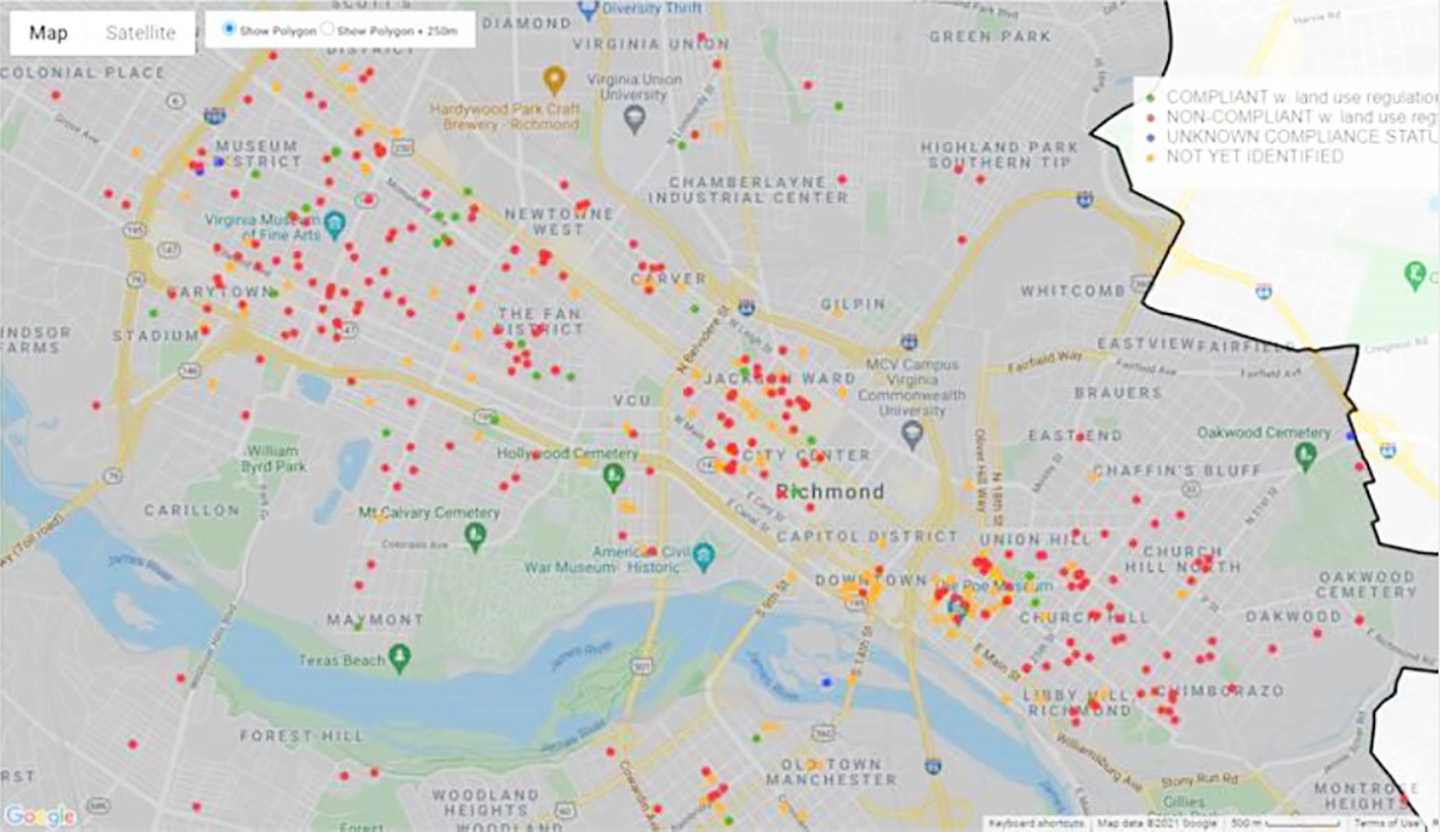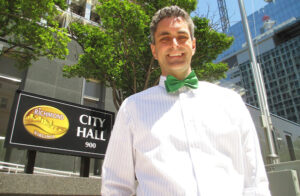
A map of identified short-term home rentals in the city show the greatest concentrations in the Fan and Museum districts, Jackson and Monroe wards, Church Hill and Shockoe. (Courtesy of the City of Richmond)
A year and a half since the city adopted rules to allow Airbnb-style home rentals in Richmond, more than 500 short-term rentals remain active in the city. But only 14 are considered legal and in compliance with the rules.
City planners are looking to change that with a revision of the rules, which went into effect in 2020 but have had minimal effect on permitting and regulating the short-term rentals, or STRs – homes or rooms rented out as lodging for less than 30 days.
A delayed rollout of a third-party compliance monitoring program, as well as the pandemic’s impacts on travel and tourism, have factored into the rules’ effectiveness, planners have said.
But at issue to most observers is a requirement that operators reside at the property being rented for at least half the year, meaning the property is considered their primary residence.
At a meeting last week, the Richmond Planning Commission approved a resolution of intent to amend the rules and revisit certain regulations, including the primary residency requirement.
While no changes to the rules have been recommended, the action starts the process of re-engaging the public and working toward revised rules that work better for operators as well as the city.
Kevin Vonck, the city’s planning director who’s leading the effort, said this week that engagement could start in February, with a goal of presenting recommendations to the commission this spring.
The commission had been slated to consider amendments to the rules last summer, having adopted them in mid-2020 with the caveat that they would be revisited after a year to review their effectiveness. But that was a year that included COVID and changes in leadership and staff within the planning department, prompting commissioners to delay the process for six months.
While he didn’t offer specific amendments at last week’s meeting, Vonck said in a presentation to the commission that recommendations would come from the process that they’re getting underway.
“We adopted an ordinance that’s been in place now for a sufficient amount of time that warrants looking at again and perhaps making some adjustments, to really enable individuals to do a short-term rental in a way that hopefully promotes more to come forward and get compliant,” Vonck said.
Using “Host Compliance” software from third-party vendor Granicus, a Denver-based company that also manages Richmond’s Legistar calendar platform for meetings, the city has identified more than 500 STRs active in the city. It also has ramped up efforts to notify operators of how to comply with the rules, sending out nearly 200 letters since April.
But since July 2020, when the rules took effect, Vonck said the city has received 84 applications for permits. And of those, only 14 permits had been issued – two more than when Vonck last presented on the topic in July.
About 40 applications were pending or under review, while the rest were either expired, voided or denied, due to issues such as incomplete applications, fees not being paid or inadequate dwellings, Vonck said.
The biennial permits come with a fee of $300 to help pay for the Granicus software and administration costs. But with 14 permits issued, the total revenue from those fees would come to $4,200, far below the roughly $35,000 the city is paying annually for the service.
“The thought was we’d register enough short-term rentals to help pay and offset the cost of the contract, and we’re not even close to doing so,” Vonck said.
Speakers in a hearing that preceded the commission’s vote put the blame for that squarely on the 185-day residency requirement, which Vonck acknowledged is challenging to enforce.
“How do you ensure that somebody who says they live in a dwelling is really waking up and going to bed there every single day? That is a very difficult thing to enforce to a tee and should be one of the things, if we do open this up for discussion, that should be considered,” Vonck said.
Stacie Vanchieri, a former STR operator who spoke at the hearing, encouraged the city to change the requirement, not only to encourage compliance but to make the program self-sustaining and potentially an additional revenue stream. She said the requirement is the reason why more operators aren’t applying for permits.
“It’s that 185-day rule that is making people go underground or not answer your letters, because they know they’re going to get denied if the city hears that they actually do not live 185 days in that home,” she said. “It seems to me that, from a financial point of view…taking out that 185-day rule is going to open up hundreds of STR operators filing permits and paying the fees for it.”
Vonck said STRs are generally seen as positive in the community because they add lodging options and help attract visitors who may not want to stay in a hotel, particularly in light of the pandemic. He said STRs are also seen as a way for residents to start businesses and generate wealth.
“I know that sometimes that can get taken as, ‘Well, it’s just a landlord or a property owner just building their wealth.’ But it’s for anyone who owns property – a way to supplement and build income,” he said.
“On the other hand, I think we do have to have concerns in terms of our housing market right now,” Vonck said, acknowledging impacts that STRs can have on housing availability.
“It’s very well-documented we have a shortage of supply of units, and so things that reallocate units from long-term living to short-term rentals can and do have an impact on the housing market,” he said. “It’s important that we have those considerations when we look at the true amount of short-term rentals in our community.”
Katherine Jordan, the commission’s City Council representative, stressed that such potential effects need to be talked about in the process.
“I agree that the one-size-fits-all isn’t really working, but I feel that we absolutely have to emphasize the negatives, which are increasing the housing costs and housing availability,” Jordan said. “The administration hears complaints about affordability, gentrification, access to housing, every day. I want to make sure that those larger goals are not lost in this conversation, which I agree does need to happen.”

A map of identified short-term home rentals in the city show the greatest concentrations in the Fan and Museum districts, Jackson and Monroe wards, Church Hill and Shockoe. (Courtesy of the City of Richmond)
A year and a half since the city adopted rules to allow Airbnb-style home rentals in Richmond, more than 500 short-term rentals remain active in the city. But only 14 are considered legal and in compliance with the rules.
City planners are looking to change that with a revision of the rules, which went into effect in 2020 but have had minimal effect on permitting and regulating the short-term rentals, or STRs – homes or rooms rented out as lodging for less than 30 days.
A delayed rollout of a third-party compliance monitoring program, as well as the pandemic’s impacts on travel and tourism, have factored into the rules’ effectiveness, planners have said.
But at issue to most observers is a requirement that operators reside at the property being rented for at least half the year, meaning the property is considered their primary residence.
At a meeting last week, the Richmond Planning Commission approved a resolution of intent to amend the rules and revisit certain regulations, including the primary residency requirement.
While no changes to the rules have been recommended, the action starts the process of re-engaging the public and working toward revised rules that work better for operators as well as the city.
Kevin Vonck, the city’s planning director who’s leading the effort, said this week that engagement could start in February, with a goal of presenting recommendations to the commission this spring.
The commission had been slated to consider amendments to the rules last summer, having adopted them in mid-2020 with the caveat that they would be revisited after a year to review their effectiveness. But that was a year that included COVID and changes in leadership and staff within the planning department, prompting commissioners to delay the process for six months.
While he didn’t offer specific amendments at last week’s meeting, Vonck said in a presentation to the commission that recommendations would come from the process that they’re getting underway.
“We adopted an ordinance that’s been in place now for a sufficient amount of time that warrants looking at again and perhaps making some adjustments, to really enable individuals to do a short-term rental in a way that hopefully promotes more to come forward and get compliant,” Vonck said.
Using “Host Compliance” software from third-party vendor Granicus, a Denver-based company that also manages Richmond’s Legistar calendar platform for meetings, the city has identified more than 500 STRs active in the city. It also has ramped up efforts to notify operators of how to comply with the rules, sending out nearly 200 letters since April.
But since July 2020, when the rules took effect, Vonck said the city has received 84 applications for permits. And of those, only 14 permits had been issued – two more than when Vonck last presented on the topic in July.
About 40 applications were pending or under review, while the rest were either expired, voided or denied, due to issues such as incomplete applications, fees not being paid or inadequate dwellings, Vonck said.
The biennial permits come with a fee of $300 to help pay for the Granicus software and administration costs. But with 14 permits issued, the total revenue from those fees would come to $4,200, far below the roughly $35,000 the city is paying annually for the service.
“The thought was we’d register enough short-term rentals to help pay and offset the cost of the contract, and we’re not even close to doing so,” Vonck said.
Speakers in a hearing that preceded the commission’s vote put the blame for that squarely on the 185-day residency requirement, which Vonck acknowledged is challenging to enforce.
“How do you ensure that somebody who says they live in a dwelling is really waking up and going to bed there every single day? That is a very difficult thing to enforce to a tee and should be one of the things, if we do open this up for discussion, that should be considered,” Vonck said.
Stacie Vanchieri, a former STR operator who spoke at the hearing, encouraged the city to change the requirement, not only to encourage compliance but to make the program self-sustaining and potentially an additional revenue stream. She said the requirement is the reason why more operators aren’t applying for permits.
“It’s that 185-day rule that is making people go underground or not answer your letters, because they know they’re going to get denied if the city hears that they actually do not live 185 days in that home,” she said. “It seems to me that, from a financial point of view…taking out that 185-day rule is going to open up hundreds of STR operators filing permits and paying the fees for it.”
Vonck said STRs are generally seen as positive in the community because they add lodging options and help attract visitors who may not want to stay in a hotel, particularly in light of the pandemic. He said STRs are also seen as a way for residents to start businesses and generate wealth.
“I know that sometimes that can get taken as, ‘Well, it’s just a landlord or a property owner just building their wealth.’ But it’s for anyone who owns property – a way to supplement and build income,” he said.
“On the other hand, I think we do have to have concerns in terms of our housing market right now,” Vonck said, acknowledging impacts that STRs can have on housing availability.
“It’s very well-documented we have a shortage of supply of units, and so things that reallocate units from long-term living to short-term rentals can and do have an impact on the housing market,” he said. “It’s important that we have those considerations when we look at the true amount of short-term rentals in our community.”
Katherine Jordan, the commission’s City Council representative, stressed that such potential effects need to be talked about in the process.
“I agree that the one-size-fits-all isn’t really working, but I feel that we absolutely have to emphasize the negatives, which are increasing the housing costs and housing availability,” Jordan said. “The administration hears complaints about affordability, gentrification, access to housing, every day. I want to make sure that those larger goals are not lost in this conversation, which I agree does need to happen.”


Always years behind that is RVA; it will be interesting to see what (if any) structural changes the recent open letters have on AirBnB which is being called out for several of those nasty side effects. Very, VERY few hosts live in the units anymore and many are now being owned by larger investors and hedge funds pushing lot of rental units off the market. Of course this is Richmond not DC, LA or NYC but New Orleans, Baton Rouge, and some small California city have banned them in certain neighborhoods or imposed strict restrictions.
Yes! Mr. Dodson is right!! Please beware of those evil hedge funds buying up your neighborhood and turning it into . . . , into — . Anyway, a hedge fund (I believe it was a hedge fund —it sure LOOKED like a hedge fund) purchased the property next door to me. And they were doing ANIMAL SACRIFICES right there on their patio. And with barbecue sauce, and drinking beer! On a calmer note, what is the objective here? Is there a rash of out-of-towners having raucous parties everywhere? Is the objective to level the playing field vis a vis… Read more »
Thank you for some much-needed humor on this site.
Typical RVA – they could screw up winning lottery ticket.
If people are breaking the law then they should be fined, heavily, and forced to stop operation until they are in compliance.
And the city should consider banning them in certain areas.
There is a housing crisis and housing shortage currently.
Ever house that is an STR is keeping a family from starting a path to the american dream of home ownership, or at the very least needlessly jacking up rental costs.
the idea that destroying people’s right to do what they want with their own house will make the world better is silly.
Accessible short term rentals are good for Richmond. We should be encouraging people to visit here, and provide options.
If they are using a structure as a sort term rental, then you need to throw out ever single idea that they are due the protection a “home owner” would get.
It’s not a “home” any longer, it’s a commercial structure like a hotel.
Or at least that is how its being used.
I’d love for anyone to explain to me why an air BNB should not have to conform with every single rule that applies hotels.
let me get this straight…sounds like we are regulating AirBnb’s to pay for software that helps us regulate Airbnb’s?
What’s the mandate for intervention here – it’s not clear. dump Granicus and stop toying with the market – as for housing affordability Ms. Jordan can support efforts to liberalize land-use and streamline permitting\planning to bring online more supply – yes even in the Fan and surrounding corridors. The ‘administration that hears complaints’ is in fact the culprit of her qualms – nice try tho to pin it on tech.
Poor financial management its is RAPIDs program; permits system is the major reason for delays, and have you gotten your false alarm registration fee to pay for that system….yep circular logic and blaming the computers that is one of the City’s biggest consistent policies.
by tech I mean popular consumer services like AirBNB
In August 2020 I applied for, and in December 2020 I received, my short term rental permit for a room in my home. I need the extra income to cover repairs of an old house and the ever rising city property taxes. In December 2021 I received two auto generated letters from city zoning saying I was not in compliance, despite the fact that I am and the listing page they sent me had my STR permit number right there in the listing as required. I called twice and finally got an answer that yes, they could see that I… Read more »
Yep, but all the self-appointed affordable housing warriors will say that the problem is rich newcomers, and not the folks who run the city and make it hard to build more housing.
Let’s start pointing out the obvious: “Gentrification” is a racist code word that is used by the same people who complained about “dis-investment.”
They complain when the middle class have reason to leave, and then they complain when they move back.
Why anyone takes them seriously intellectually (oh, sure, they can make trouble….) is beyond my understanding.